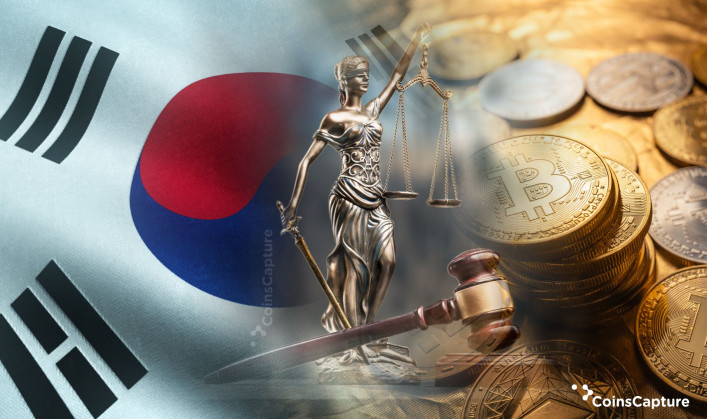1 October 2024
Latest Cryptocurrency Laws in South Korea
Although Cryptocurrency exchanges are allowed in South Korea, they are subject to stringent regulation since Cryptocurrencies are not recognized as legal money there. Cryptocurrency transactions aren't any longer taxable in South Korea since they are neither cash nor financial assets. Nonetheless, a taxation on Crypto transaction earnings is being considered by the Ministry of Strategy and Finance, which expects to present a taxation structure for 2023.
Also Read: IP Rights Protection Technologies And Blockchain
The perfect Cryptocurrency legislation and digital asset regulation would strike a balance between consumer protection and fostering innovation and entrepreneurship. As a result, politicians and regulators throughout the globe are trying to strike a balance between fostering innovation in technology as well as putting in place the safeguards needed to avoid illegal activity on the side of market players such as people and corporations. When it comes to blockchain and Cryptocurrencies, South Korea has emerged as a major participant in the Asian market. But, the business is under more scrutiny than ever due to the rising popularity of Cryptos. South Korea has adopted a proactive stance in the regulation of digital assets, passing a number of laws meant to guarantee the smooth and secure functioning of the local Cryptocurrency market.
Also Read: Crypto Goes Mainstream In India As Investor Numbers Surge
Latest Regulations in South Korea
Financial Supervisory Service of South Korea (FSS) regulates and enforces strict legislation pertaining to Cryptocurrency exchanges in South Korea. Concerns above a possible ban on Bitcoin led the South Korean government to crack down on anonymous Cryptocurrency trading accounts in 2017. The authorities also prevented local financial institutions from hosting Bitcoin features transactions. Moreover, in 2018, the FSC imposed stricter reporting obligations on financial institutions that maintained accounts with Cryptocurrency exchanges. In order to make deposits or withdraw funds from an electronic wallet, a trader must open a real-name bank account with the same bank as their bitcoin dealer, according to the new regulations. The financial institution as well as the dealer are both obligated to confirm the trader's identification under AML/CFT regulations and structured transaction reporting norms.
Legality of Crypto in South Korea
Everyone interested in the Cryptocurrency sector and its possible future advancements must have a firm grasp of the regulatory framework in place in South Korea. Several individuals in South Korea have asked me who's in charge of regulating Cryptocurrencies and what their legal position is. The South Korean government has provided Cryptos the go-ahead by enacting a careful mixture of regulations and laws meant to ensure the relatively secure as well as protect activity of the Cryptocurrency market in the belief that Cryptocurrencies can stimulate the tech-oriented economy and provide new business opportunities in the global industry.
Towards What Categories Do the Proposed Rules Apply?
Businesses that facilitate the buying and selling of Cryptocurrencies, the transmission of Cryptocurrencies, the management of virtual assets, and the administration of virtual assets are all subject to the new regulations. Many parties are engaged in these dealings, including Cryptocurrency exchanges, custodial wallet providers, and Initial Coin Offering (ICO) initiatives.
Can South Koreans Purchase Crypto?
South Korea is not alone in seeing a rise in the usage of Cryptocurrencies in recent years. Many individuals are wondering first if they may really purchase Cryptocurrencies in South Korea. The safe and secure functioning of Cryptocurrency exchanges in South Korea is governed by a number of rules and laws. The Cryptocurrency market in South Korea is dominated by a handful of major, centralized exchanges, all of which are under tight surveillance by regulatory authorities to assure they are in compliance with local laws and standards. There are now licensing criteria for businesses that deal in virtual assets due to a change made to the Act on the Reporting and Use of Specified Financial Transaction Information (VASPs). To safeguard customers and prevent criminal activity like money laundering and fraud, the rule subjects exchanges and other VASPs to a specialized licensing system with stringent criteria and continuing reporting obligations. With regards to the jurisdiction of said legislation, VASPs are defined as organizations that provide services pertaining to data assets. Under the statute, "virtual asset service provider" has a broad meaning. Because of the expansive nature of the implementation, most organizations providing digital asset solutions are now subject to regulation, even if they are not technically classified as exchanges. Included in this concept are businesses that facilitate the buying, selling, swapping, safeguarding, management, or mediation of electronic resources as well as activities. This includes, but is not limited to, trading platforms, custody and administration services, and digital wallet providers. Professional suppliers in this sector are obligated to follow the rules established by the FSC.
The Bottomline
South Korea has said that, in context to the proposed tax structure for Cryptocurrencies, it would continue to endeavor to bring the company into line with the FATF's anti-money laundering standards. It is unclear, nonetheless, if the new legislation will loosen or tighten restrictions on minimum age for local customers, allow for accessibility by overseas or nameless dealers to withdraw money from e-wallets, or alter the rules around withdrawing cash. To further restrict the use of private currencies on exchanges, South Korea plans to amend its Special Payment Act in March 2023.
Disclaimer: The author’s thoughts and comments are solely for educational reasons and informative purposes only. They do not represent financial, investment, or other advice.






